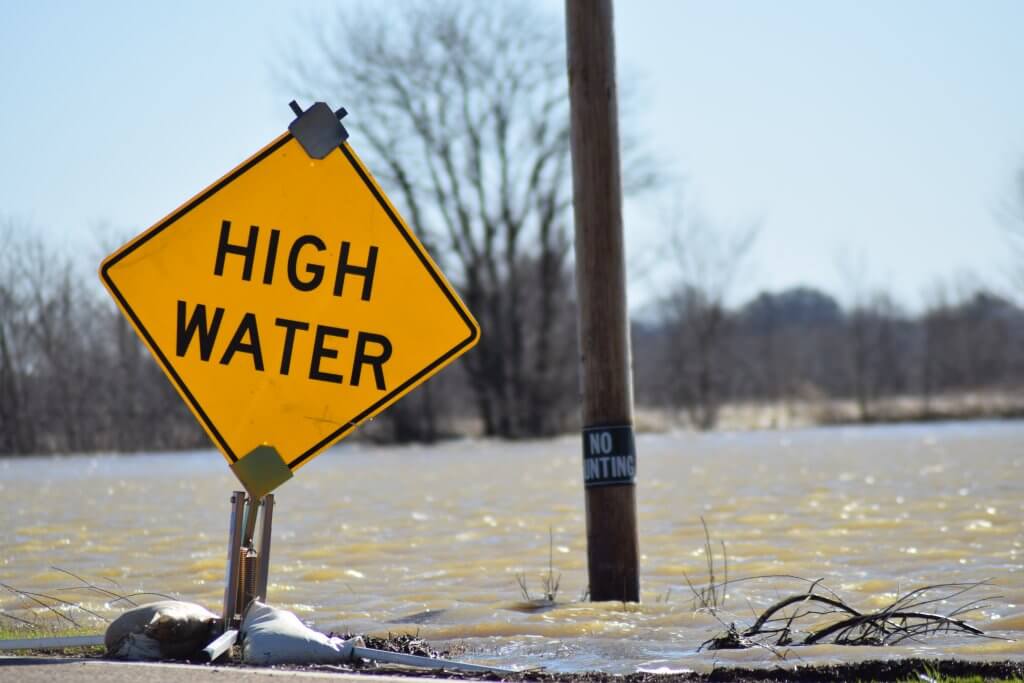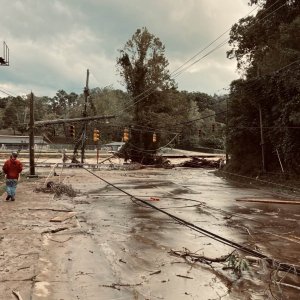Emergency Response Resources to Drinking Water Quality Post-Flooding
Hurricane Helene has wrecked havoc in several southeastern states, and Hurricane Milton is barreling towards Florida. These latest climate disasters have left a devastating trail of destruction, leaving many communities without power, cell service, and running water. Our hearts go out to all those affected, including our River Network staff in Asheville, North Carolina, and in Florida, who are thankfully safe amidst the widespread flooding.
These events serve as a stark reminder of the critical importance of proactive planning and the urgent need to build resilient communities. This blog is a work-in-progress to provide timely resources related to flooding impacts and drinking water safety.
Flooding Can Make Water Unsafe to Drink
Heavy rainfall can make well water unsafe to drink. If you think flooding has impacted your well water, use bottled water. Do not use water from a flooded well until it has been tested. If the well was flooded and underwater, do not turn on the pump until you are sure the electrical system is completely dried out. Pumps need to be cleaned and lubricated if they’ve been covered by flood water and sediment.
If you get your water from a public water system and are under a boil water advisory, boil water for drinking, making ice, brushing teeth, and washing any areas of the skin that have been cut or injured.
Waterways affected by flooding may also be unsafe to contact – East Tennessee surface waters may be contaminated by wastewater treatment plants that were compromised, for example. Floodwaters may bring contamination from other industries, farmland, and power plants, and standing water can increase the presence of mold and insects, like mosquitoes, that can carry diseases.

NCDHHS Urges Safe Water Usage following Hurricane Helene
– press release from 10/1 includes the following:
Ensure Well Water is Safe
“If extensive flooding has occurred, do not drink well water. Listen to your local health authorities for advice on using well water for showering and bathing. Use water reserves, bottled water or boiled water until your well water has been tested and deemed safe for use.
After a flood, the following steps can help ensure your well is safe for use:
- Do not turn on the electricity to your pump until flood waters recede.
- Contact a driller if you think your well will need service immediately after the flood. Find a list of certified well contractors.
- If you haven’t already, find a nearby water testing lab to obtain sample collection bottles and instructions for bacterial contamination. You cannot see, taste or smell bacterial contamination in your well. The NC State Laboratory of Public Health provides free well water sampling kits and testing, and often, your local health department can test your water. If there is not a health department near you, your county extension agent can help you find a lab.
- If you live near animal feeding operations, agricultural fields where pesticides are applied or industrial chemical factories, you should contact your local health department for additional testing, especially if you smell fuel or chemicals in your water.
- It is strongly recommended to call your local health department or licensed well driller to shock chlorinate the well if it has been flooded. A water well driller will have access to more effective products and will have equipment and experience that a typical well owner will not have. Find more information about well water and health.”
How to Assess Your Well Water for Contamination
- This step-by-step guide for assessing well water after flooding is from New York’s Department of Health, but should generally apply anywhere.
EPA’s What to do After the Flood pamphlet also describes steps to take.

Boiling or Disinfecting Your Water
From Florida’s Department of Health
If you are unsure if your tap water is safe, boil or disinfect it, or use bottled water.
- Boiling tap water is the best way to kill harmful parasites, bacteria and viruses. The process is complete when the water is held at a rolling boil for at least one minute. Let the water cool before using.
- If boiling is not an option, disinfect tap water by adding eight drops of regular unscented household bleach (4 to 6 % strength)—this is about one-eighth teaspoon or a dime-sized puddle, per gallon of water. If a higher strength bleach is used (8.25 % strength), only add seven drops of bleach. Mix the solution and let it stand for 30 minutes. If the water is cloudy after 30 minutes, repeat the steps once.
Rapid Drinking Water Testing Options
We suggest reaching out to your state’s health or public safety department or local health department to see if they can provide free or low-cost testing
If you’re able to order tests online (which may not be feasible if roads are shut off), they are available on Amazon and other online retailers.
- Safe Home® BACTERIA in Water Test Kit – Detects 50 Different Species of Coliform Bacteria Including E. Coli – Detection Level to 1 Organism – (4 Pack)
- Get results in 24-72 hours
- Can be used at “room temperatures”
-
- Rapid and robust E. coli and total coliform water quality test kits do not require refrigeration or electricity.
- Get results in 20-48 hours
- Water Testing Kits for Drinking Water: 125 Strips 16 in 1 Well and Drinking Water Test Kit, TESPERT Water Test Strips with Hardness, pH, Lead, Iron, Copper, Chlorine, and More
- Note that this tests for 16 contaminants, but does not include bacteria testing
Tennessee
- TN Hurricane Helene Disaster Page
- TN Disaster Hotline: 423-830-2696
- Department of Health
- Info for private well owners, how to test water quality
- TDOH Division of Laboratory Services, in partnership with TDH Communicable and Environmental Diseases and Emergency Preparedness (CEDEP) Waterborne Program has a “pilot program” for emergency response test kits for private well owners – they may be able to direct you to where to find a rapid test kit.
North Carolina
- NC Hurricane Helene Disaster Page
- Department of Health
South Carolina
- SC Hurricane Helene Disaster Page
- Department of Health
- Drinking Water Safety After a Flood
- Private Well Hotline: 1-888-761-5989
- To test the water from a residential well, a well owner can obtain a sample kit from their local South Carolina Department of Environmental Services (SCDES) Regional Office or Health Department. There are two types of kits, one for a coliform bacteria test and one for a metals and minerals analysis
Florida
- FL Hurricane Helene Disaster Page
- Department of Health
- State Assistance Information Line 1-800-342-3557
- Private well testing information
- Department of Health
Georgia
- GA Hurricane Helene Disaster Page
- This includes a list of points of distribution across impacted counties to access essential items!
Virginia
Mutual Aid & Local Non-Profits Providing Relief Assistance
Please consider donating your time, resources, or money to the below groups offering assistance in the wake of Hurricane Helene. Need support? Try reaching out to a mutual-aid group or non-profit near you for assistance. Many are staying up-to-date with resources on their websites, Instagram and Facebook pages.
Do you know of other groups we should add to this list? Please email Shelby at scline@rivernetwork.org or add as a comment for us to update.
Additional Aid:
Click on name to open link.
Click on name to open link.
Click on name to open link.
- Appalachian Voices
- BeLoved Asheville
- Poder Emma
- Rural Organizing and Resilience
- Hearts with Hands
- Pansy Collective
- Greensboro Mutual Aid
- Mutual aid hubs are also located at the following locations:
- Carrboro, Back Alley Bikes
- Raleigh, RUMAH
- Durham, Art Post and The Scrap Exchange and Maverick’s Smokehouse and Taproom and Fuzzy Needle
- Marshall, Marshall Mutual Aid Hub (Suite 1685 Hwy 213)
Click on name to open link.
Click on name to open link.
- Unidos Immokalee
- Voices of Florida
- Tampa Bay Mutual Aid
- Pinellas Community Foundation
- Food Not Bombs
- In Tallahassee, St. Petersburg, and Gainesville
Click on name to open link.





